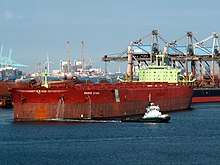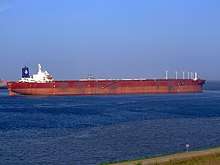MS Berge Stahl
MS Berge Stahl is a bulk carrier. Until the delivery of MS Vale Brasil in 2011 she was the longest and largest iron ore carrier in the world.[3] She is registered in Douglas, Isle of Man. Before that, she was registered in Stavanger, Norway as well as in Monrovia, Liberia.
Berge Stahl had been the world's largest bulk carrier until 2011 | |
| History | |
|---|---|
| Name: | Berge Stahl |
| Owner: |
|
| Operator: |
|
| Port of registry: |
|
| Route: |
Brazil to Oman Previously Brazil to Rotterdam |
| Builder: | |
| Laid down: | 14 March 1986[1] |
| Launched: | 4 September 1986[1] |
| Completed: | 4 December 1986[1] |
| Identification: |
|
| Fate: | Active |
| General characteristics | |
| Type: | Bulk carrier (Ore carrier)[2] |
| Tonnage: | |
| Length: | 342.08 m (1,122.3 ft)[1] |
| Beam: | 63.53 m (208.4 ft)[1] |
| Draught: | 23 m (75 ft) |
| Installed power: | Hyundai 7L90MCE |
| Propulsion: | Single shaft; 9 m (30 ft) fixed pitch propeller |
| Speed: | 13.5 knots (25.0 km/h; 15.5 mph) |
| Crew: | 24 |
| Notes: | [1] |
An iron ore carrier, Berge Stahl has a capacity of 364,767 tonnes deadweight (DWT) . She was built in 1986 by Hyundai Heavy Industries.[1][4] The vessel is 342.08 m (1,122 ft) long, had a beam, or width, of 63.5 m (208 ft), and a draft, or depth in the water, of 23 m (75 ft).[1]
Her MAN B&W 7L90MCE diesel engine is 9 m (30 ft) high, drives a single 9 m (30 ft) propeller, and puts out 27,610 horsepower (20.59 MW). The ship has a top speed of 13.5 knots (25.0 km/h; 15.5 mph), and has a 9 m (30 ft) rudder.[1]
She is currently owned by the Singaporean-operated shipping company Berge Bulk.[1]
Because of its massive size, Berge Stahl could originally only tie up, fully loaded, at two ports in the world, hauling ore from the Terminal Marítimo de Ponta da Madeira in Brazil to the Europoort near Rotterdam in the Netherlands. Even at these ports, passage must be timed to coincide with high tides to prevent the ship running aground. Berge Stahl made this trip about ten times each year, or a round-trip about every five weeks.[5]
The newly opened deep-water iron ore wharf at Caofeidian in China received the fully loaded Berge Stahl in October 2011,[6] and several other Chinese ports have since opened to receive Vale's even larger Valemax ships. Berge Stahl can operate from other ports if not fully loaded. In September 2006, the ship carried ore to the port of Majishan, China, where it was dry-docked and given its twenty-year inspection.[7] On the return voyage to Rotterdam, the ship picked up a partial load of ore in Dampier, Western Australia, and Saldanha Bay in South Africa (where the maximum draft permitted is 21 m).[8] In April 2014, the Berge Stahl received her very last dry-docking, in Portugal.[9] The owner Berge Bulk announced that the thirty-year-old vessel performed her last voyage to Rotterdam in the autumn of 2016. She was then headed for dry dock, where she was refitted before commencing a new contract transporting iron ore from the Port of Tubarão in Brazil to Sohar, Oman.[9]
A trip from Brazil to The Netherlands


Brazil
To load the ship in Brazil cargo trains transport ore from the mines of Vale via a 900 km rail to the Terminal Marítimo de Ponta da Madeira. Every day seven trains, each with 204 freight cars and four locomotives, bring ore from the mines to the port. When the Berge Stahl arrives in port it takes some 35 hours to load the ship. Once full it sails to Rotterdam in about 14 days.
And at least one time per year she took Vitória in Port of Tubarão (last call in 22/2 December, 010) for load maximum 300,000 tons (draft about 21 meters) of iron ore for Asia (Japan or China).
Arriving in Rotterdam
When the ship passes Cherbourg in France it starts to slow down. On some 60 km before arrival the ship takes two pilots on board via helicopter. The pilots assist the captain in sailing through the deep water route named the Eurogeul. At 20 km before Rotterdam the ship again decreases speed and enters the Maasgeul leading to Rotterdam. The passage of the Maasgeul can only be made during specific times, based on the tide and also the weather; if the ship misses her slot, she has to wait 12 hours for the next possible passage.
To pass through the Maasgeul the ship can not be loaded to capacity as her draught would then be 23 meters while the minimal depth of the Maasgeul is 24 meters, since if the ship leans over to one side at an angle of only 3° then she lies 1.65 meters deeper in the water. For this reason the Berge Stahl can only be loaded with 354,000 tonnes (while she can carry 364,768 tonnes).
When the Berge Stahl passes the Maascenter buoy she is escorted by a patrol ship of the Port of Rotterdam. On passing the piers four tugboats connect to the ship to help her slow down and to dock her at the EECV terminal. For docking a harbour pilot comes on board.
Once docked it takes some 3.5 days to transfer all the ore into barges. These barges bring the ore to the steel-mills of Thyssen Krupp and HKM in the Ruhr in Germany.
Return trip
During unloading of the ship the ballast tanks are filled with 118,000 tons water. During her return voyage 20% of this ballast is pumped overboard after passing the Gulf of Biscay as the risk of bad weather decreases and the ship will use less fuel when she carries less ballast (which decreases her draught). During the return voyage the cargo area is painted to prevent wear. The return trip takes approximately 11 days.
See also
- List of ship launches in 1986
- List of the world's longest ships
- Berge Fjord
- List of longest ships
- TI-class supertanker
References
- "Deepwater Discovery (14702)". DNV GL Vessel Register. Det Norske Veritas. Retrieved 4 June 2010.
- Equasis
- "Vale Brasil (30616)". DNV GL Vessel Register. Det Norske Veritas. Retrieved 11 June 2011.
- "Propulsion Trends in Bulk Carriers" MAN Diesel Group – retrieved: 12 April 2007 (Adobe Acrobat *.pdf document)
- "Machine Support services on world's largest dry bulk carrier" Machine Support News
- 曹妃甸港首次接卸30万吨以上铁矿石巨轮, 31 October 2011, archived from the original on 26 April 2012
- "Largest bulk cargo ship in the world comes to China" – CNSPhoto.com – 7 September 2006
- "Media Miss Once-Off South African Visit by Berge Stahl" (PDF). The Cape Times. 27 December 2006. Archived from the original (PDF) on 25 July 2011. Retrieved 3 July 2010.
- "Berge Stahl". Berge Bulk Website. 18 December 2017. Retrieved 18 December 2017.